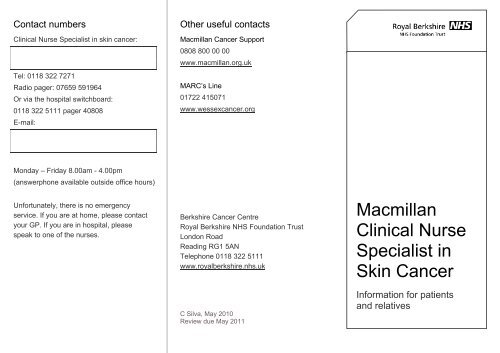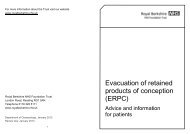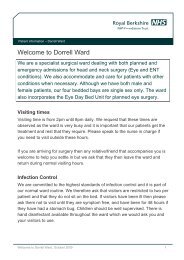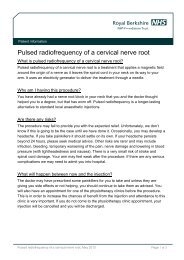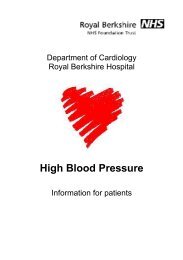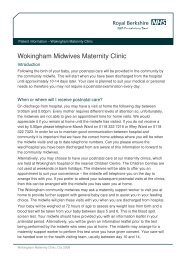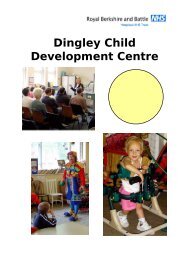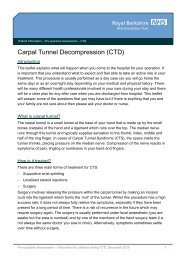Macmillan Clinical Nurse Specialist in Skin Cancer - The Royal ...
Macmillan Clinical Nurse Specialist in Skin Cancer - The Royal ...
Macmillan Clinical Nurse Specialist in Skin Cancer - The Royal ...
Create successful ePaper yourself
Turn your PDF publications into a flip-book with our unique Google optimized e-Paper software.
Contact numbers<br />
<strong>Cl<strong>in</strong>ical</strong> <strong>Nurse</strong> <strong>Specialist</strong> <strong>in</strong> sk<strong>in</strong> cancer:<br />
Tel: 0118 322 7271<br />
Radio pager: 07659 591964<br />
Or via the hospital switchboard:<br />
0118 322 5111 pager 40808<br />
E-mail:<br />
Other useful contacts<br />
<strong>Macmillan</strong> <strong>Cancer</strong> Support<br />
0808 800 00 00<br />
www.macmillan.org.uk<br />
MARC’s L<strong>in</strong>e<br />
01722 415071<br />
www.wessexcancer.org<br />
Monday – Friday 8.00am - 4.00pm<br />
(answerphone available outside office hours)<br />
Unfortunately, there is no emergency<br />
service. If you are at home, please contact<br />
your GP. If you are <strong>in</strong> hospital, please<br />
speak to one of the nurses.<br />
Berkshire <strong>Cancer</strong> Centre<br />
<strong>Royal</strong> Berkshire NHS Foundation Trust<br />
London Road<br />
Read<strong>in</strong>g RG1 5AN<br />
Telephone 0118 322 5111<br />
www.royalberkshire.nhs.uk<br />
C Silva, May 2010<br />
Review due May 2011<br />
<strong>Macmillan</strong><br />
<strong>Cl<strong>in</strong>ical</strong> <strong>Nurse</strong><br />
<strong>Specialist</strong> <strong>in</strong><br />
Sk<strong>in</strong> <strong>Cancer</strong><br />
Information for patients<br />
and relatives
This leaflet has been provided to<br />
answer some of the questions<br />
you may have about the role of<br />
the <strong>Cl<strong>in</strong>ical</strong> <strong>Nurse</strong> <strong>Specialist</strong> and<br />
Key Worker with<strong>in</strong> the <strong>Royal</strong><br />
Berkshire NHS Foundation Trust.<br />
2. Melanoma<br />
This is a cancer that develops from<br />
pigment produc<strong>in</strong>g cells, and often<br />
presents as a new or chang<strong>in</strong>g mole.<br />
Melanomas can be cured if treated early,<br />
but will spread to other parts of the body<br />
if left untreated.<br />
What can the <strong>Cl<strong>in</strong>ical</strong> <strong>Nurse</strong><br />
<strong>Specialist</strong> offer me?<br />
−<br />
−<br />
A contact po<strong>in</strong>t for people with cancer<br />
at any stage.<br />
Advice and support for you, your<br />
relatives, carers and friends.<br />
What does the <strong>Cl<strong>in</strong>ical</strong> <strong>Nurse</strong><br />
<strong>Specialist</strong> do?<br />
She is able to offer <strong>in</strong>creased levels of<br />
support, advice and guidance to patients who<br />
have sk<strong>in</strong> cancer anywhere on their body.<br />
Sk<strong>in</strong> cancers can be put <strong>in</strong>to two groups:<br />
1. Non melanoma sk<strong>in</strong> cancer<br />
i) Basal Cell Carc<strong>in</strong>oma (BCC)<br />
This is the most common form of sk<strong>in</strong><br />
cancer. It is very slow grow<strong>in</strong>g, and<br />
rarely spreads to other parts of the body.<br />
ii) Squamous Cell Carc<strong>in</strong>oma (SCC)<br />
This is also a slow grow<strong>in</strong>g form of sk<strong>in</strong><br />
cancer, which develops <strong>in</strong> the outer layer<br />
of the sk<strong>in</strong>. If left untreated, it can spread<br />
to other parts of the body.<br />
<strong>The</strong> <strong>Cl<strong>in</strong>ical</strong> <strong>Nurse</strong> <strong>Specialist</strong> works closely<br />
with hospital nurses, doctors and other health<br />
care professionals to co-ord<strong>in</strong>ate care for<br />
people suffer<strong>in</strong>g from sk<strong>in</strong> cancer. She also<br />
l<strong>in</strong>ks with community carers and family doctors<br />
(GPs) to maximise the communication<br />
between all the <strong>in</strong>volved personnel.<br />
You may see the <strong>Cl<strong>in</strong>ical</strong> <strong>Nurse</strong> <strong>Specialist</strong><br />
when you are on the ward, whilst hav<strong>in</strong>g<br />
treatment or at your outpatient<br />
appo<strong>in</strong>tments. You can also contact your<br />
<strong>Cl<strong>in</strong>ical</strong> <strong>Nurse</strong> <strong>Specialist</strong> for support and<br />
advice when you are at home.<br />
−<br />
−<br />
−<br />
−<br />
−<br />
−<br />
−<br />
Help with physical symptoms such as<br />
pa<strong>in</strong>, fatigue or nausea.<br />
Advice about treatments such as<br />
radiotherapy and chemotherapy.<br />
Information about your illness.<br />
Advice on your cont<strong>in</strong>ued care at<br />
home.<br />
Someone to talk to about worries or<br />
problems.<br />
Advice on relationship, fertility or<br />
sexual problems.<br />
Advice and help on how to manage<br />
f<strong>in</strong>ancial problems.<br />
Also, the <strong>Cl<strong>in</strong>ical</strong> <strong>Nurse</strong> <strong>Specialist</strong> will either act<br />
as your key worker, or ensure that this role is<br />
carried out by another professional. <strong>The</strong> cl<strong>in</strong>ical<br />
nurse specialist/key worker is your ma<strong>in</strong> po<strong>in</strong>t<br />
of contact with<strong>in</strong> the hospital and will be<br />
responsible for co-ord<strong>in</strong>at<strong>in</strong>g your care.


